Since learning about how diet can drastically affect oral health and the need for minerals in the body for oral health, I’ve increasingly turned to homemade mineral-rich natural toothpaste options.
Why Use Natural Toothpaste?
I’m not a dentist or a doctor, just a mom who has tried a TON of different toothpaste options and read a TON of books and medical literature. I first started making my own toothpaste after getting frustrated that I couldn’t find a store-bought brand that didn’t have questionable ingredients, including:
- Sweeteners: Artificial sweeteners like sodium saccharin are often used in toothpaste to improve taste, but some of these substances are controversial. Until scientists reach some more definitive conclusions, sugar alcohols like sorbitol and xylitol seem to be a better choice and rated safe for non-food uses by the EWG.
- Fluoride: The most controversial toothpaste ingredient. I personally have to avoid it like the plague because of my thyroid disease (read about the connection here). Additionally, fluoride interferes with my thyroid hormone uptake. Our family doesn’t use fluoride toothpaste and we filter it out of our water, but there is definitely research on both sides. (You can read Mark Sisson’s take here and Dr. Mercola’s opinion here.) Whatever your opinion, fluoride does come with a warning to call the poison control center immediately if ingested and after seeing a close friend’s scare when her son ingested some fluoride, it isn’t something I keep in our house.
- Triclosan: A chemical used in antibacterial soaps and products. Triclosan was found to affect proper heart function in a study at the University of California Davis and the FDA ruled in 2017 that triclosan isn’t generally recognized as safe.
- Glycerin: Another controversial ingredient, glycerin is found in many toothpastes, especially natural toothpastes. Glycerin is a sweet, colorless liquid and some research says it can coat teeth and prevent them from benefitting from the minerals in saliva. I know that when I used glycerin toothpaste in college, my teeth started to yellow, but the research is still mixed on whether glycerin is harmful or not. Especially when I was working to remineralize cavities, I concluded after research that it was better to just avoid it.
- Surfactants: Many kinds of toothpaste contain surfactants like sodium lauryl sulfate, which gives toothpaste its foam and lather. Some research shows that SLS can cause mouth ulcers and canker sores.
- Artificial colors/dyes or synthetic flavors: There are a few good natural toothpastes out there, but after looking at the ingredients, I realized I could make a similar concoction at home… and the toothpaste experiment was born.
Homemade Toothpaste Trial & Error
If you’re not sure you want to try making your own toothpaste, there are good store-bought options out there (scroll down for my favorites).
If you’re a DIY master, then jump right in!
I admit, I had several failed attempts before I figured this recipe out. I originally tried mixing coconut oil and baking soda in equal proportions (which makes coconut-tasting salt!). I also tried using pure ground stevia leaf, but my husband and kids couldn’t get past the green color.
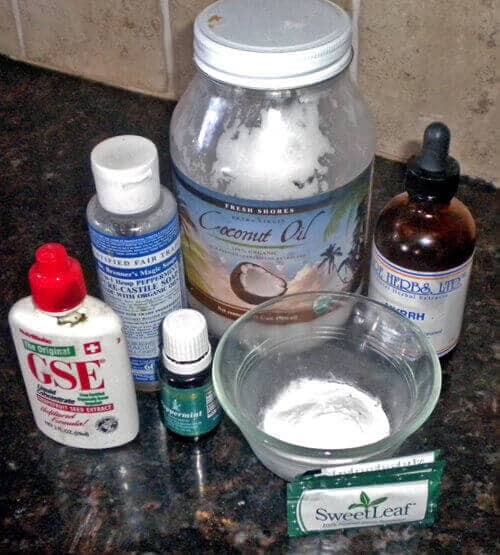
I finally made a concession to use stevia powder (the most natural one I could find). I’ve also tried making this with xylitol, as it has some supposed benefits in dental health.
Here it is… the new, improved, and kid-approved recipe!
Natural Toothpaste Recipe
Materials
- ½ cup coconut oil
- 2-3 TBSP baking soda
- 2 small packets stevia powder
- 15-20 drops peppermint essential oil (or cinnamon essential oil)
- 10 drops myrrh essential oil (optional)
Instructions
- Melt or slightly soften the coconut oil.
- Mix in other ingredients and stir well. If you are using a semi-hard coconut oil, use a fork, if not, use a spoon. If you are using completely melted coconut oil, you will need to stir several times while the mixture cools to keep the baking soda incorporated.
- Pour the mixture into a small glass jar (I make different ones for each family member).
- Let cool completely.
Notes
Does Homemade Toothpaste Work?
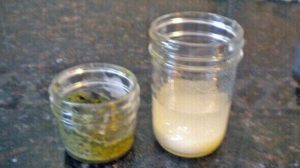 We have been using natural toothpaste years now, and it seems to work great! I’ve noticed less plaque when brushing our teeth, and my teeth feel smoother. Years of great dental checkups have to count for something, and I have several friends who have used similar concoctions for years and never get cavities.
We have been using natural toothpaste years now, and it seems to work great! I’ve noticed less plaque when brushing our teeth, and my teeth feel smoother. Years of great dental checkups have to count for something, and I have several friends who have used similar concoctions for years and never get cavities.
More DIY Toothpaste Recipes
Since I originally wrote this post, I’ve created a few additional toothpaste recipes which are even easier to make! I still love this recipe, but you may also want to check out these:
Pre-Made Natural Toothpaste Options
If you don’t want to make toothpaste yourself, thankfully, there are several pre-made natural toothpaste options that are both effective and safe. Some of my favorites are:
Wellnesse
My Wellnesse Whitening Toothpaste uses only the safest EWG-rated ingredients, like hydroxyapatite to remineralize teeth and make them strong, and neem oil to fight unhealthy bacteria that cause bad breath and plaque. Instead of fluoride, our formula contains green tea leaf extract, which is loaded with antioxidants. Plus, a phytochemical in green tea is shown to fight bacteria that leads to tooth decay. Did we mention our toothpaste is Glycerin-Free?
OraWellness Brushing Blend
I use OraWellness Brushing Blend as an ingredient in many of my homemade oral health products, but I also just like using it alone. It is great for traveling, even for flying since it comes in a small bottle and since you only need a few drops, it lasts forever.
We also use OraWellness Bass Toothbrushes regularly at our house.
Earthpaste
Earthpaste is another favorite at our house. The kids like the lemon flavor and my husband and I like all three mint options (cinnamon, peppermint, and wintergreen). I haven’t found it locally, so I often bought a four-pack online every few months.
This article was medically reviewed by Dr. Steven Lin, who is a Board accredited dentist trained at the University of Sydney. With a background in biomedical science, he is a passionate whole-health advocate, focusing on the link between nutrition and dental health. As always, this is not personal medical advice and we recommend that you talk with your doctor or dentist.
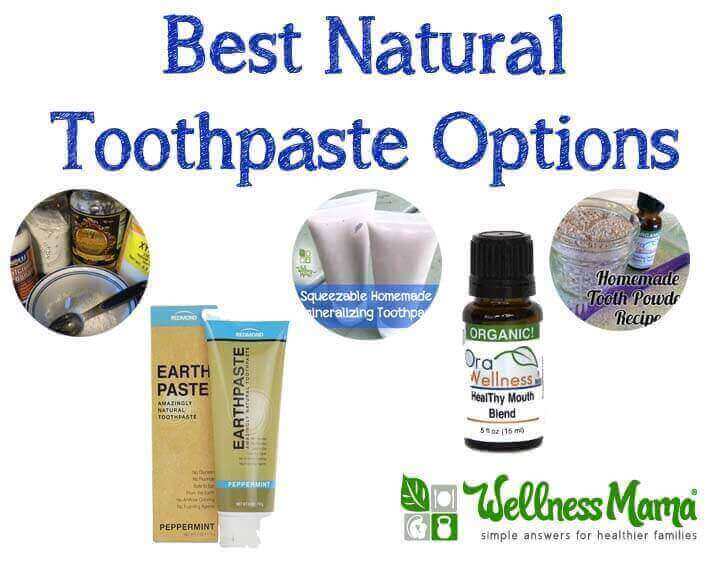
What do you think? Up for making your own toothpaste, or is it too much? Tell me about it below!
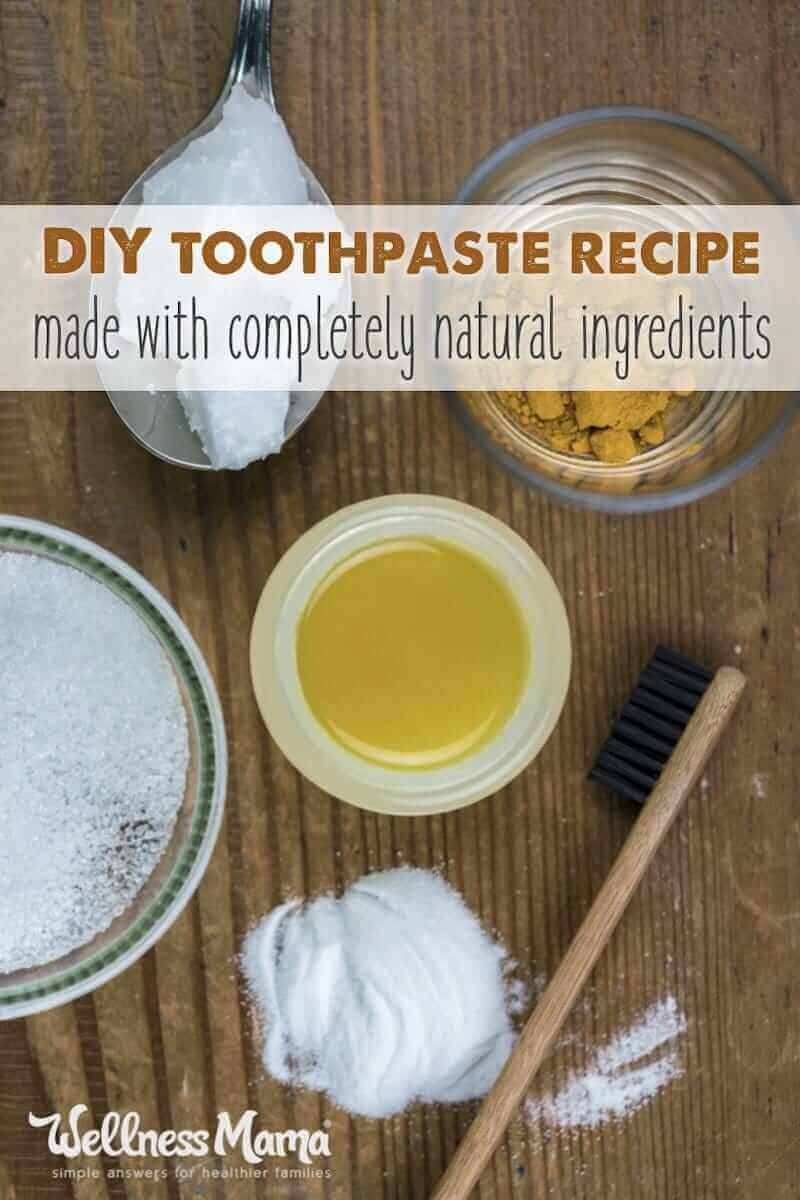

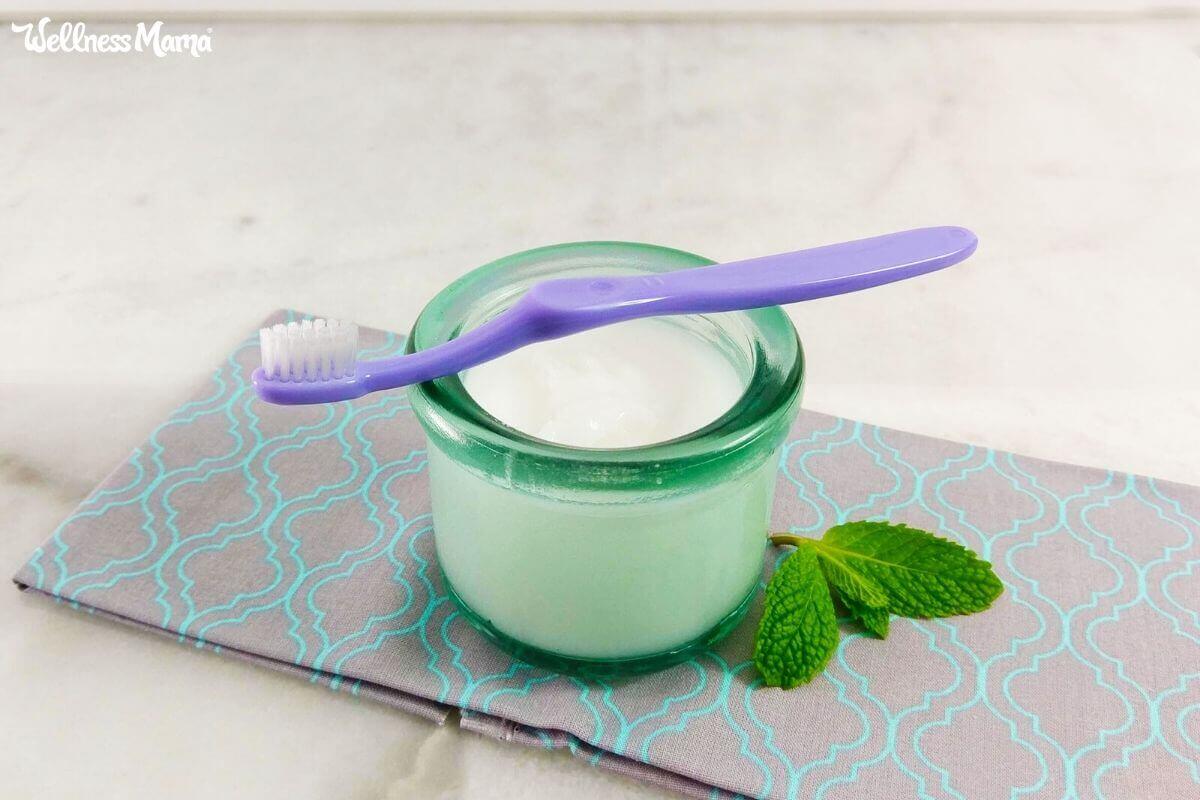
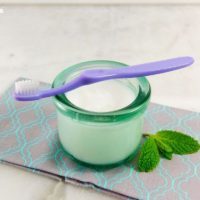
Leave a Reply